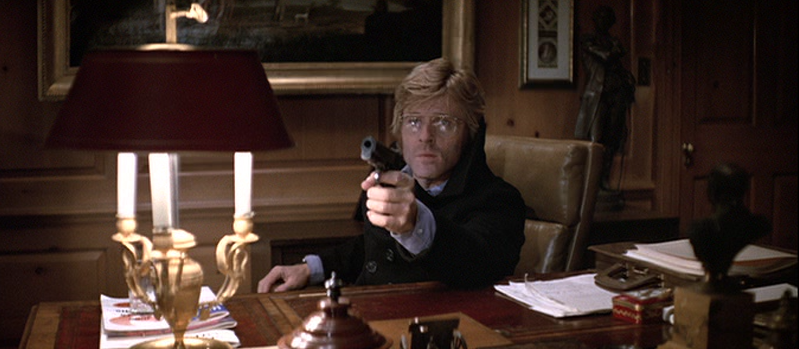
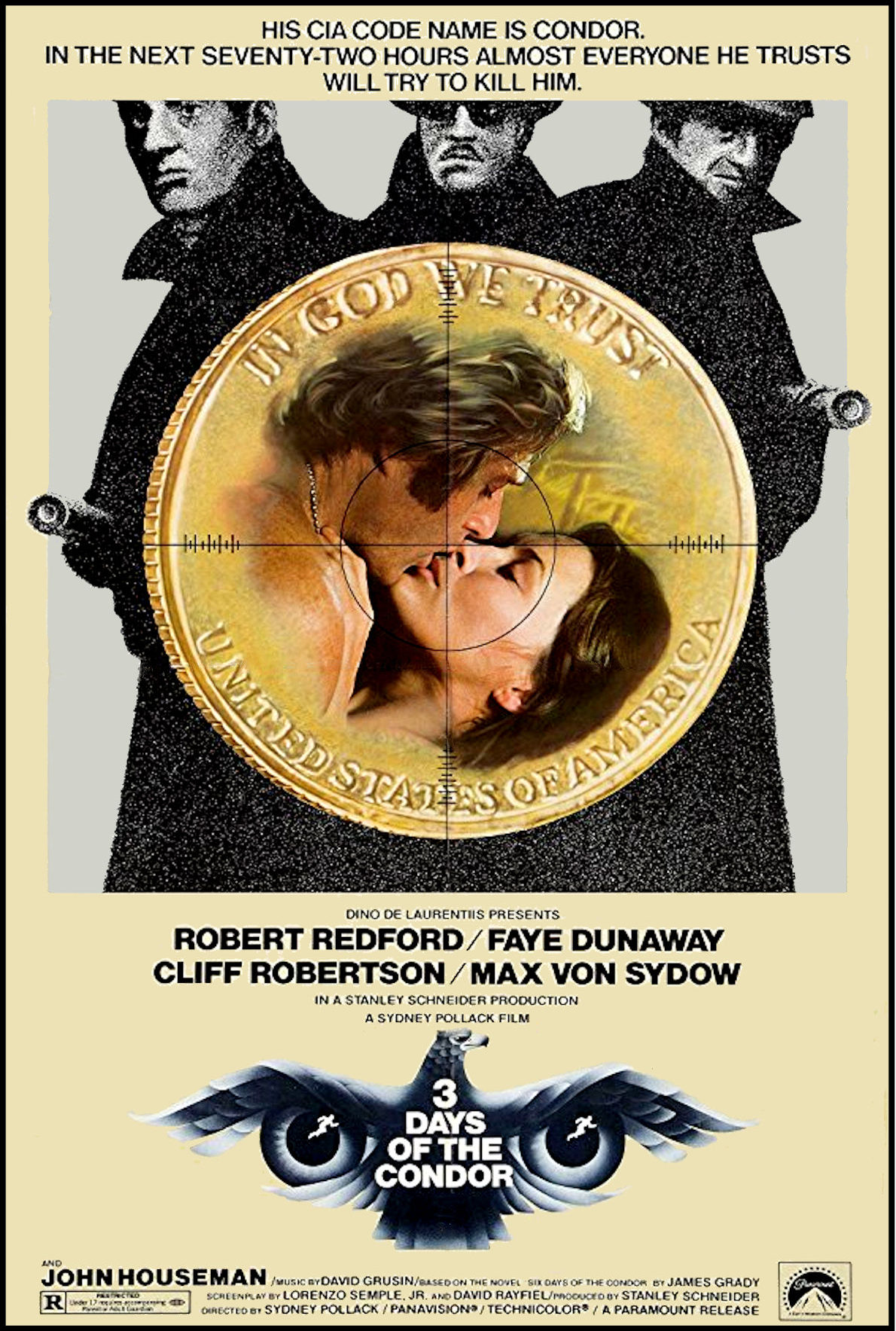
“Condor is an amateur. He’s lost, unpredictable, perhaps even sentimental. He could fool a professional. Not deliberately, but precisely because he is lost, doesn’t know what to do.”
Sydney Pollack’s 3 Days of the Condor is a tight little spy thriller that does a lot of things right. Set in New York City and Washington, D.C. the film smartly avoids flashy locations or cheesy antagonists, distancing it from over-the-top films in the genre like the James Bond series. Our protagonist is not a superhero, but a bookworm, whose job for the CIA is to read novels, magazines, and newspapers from around the world and analyze them for hidden meanings or disguised communications. Soon after submitting a report noting that a particular novel has been translated into a number of disparate foreign languages despite poor sales, Joe Turner (Robert Redford)—codename Condor—returns from his lunch break to find that the rest of his co-workers have been gunned down in their office. That’s a great premise, but the execution doesn’t quite follow through on its promise.
Despite his immediate paranoia, Turner phones the CIA and asks them to bring him in. At the rendezvous, his superior tries to gun him down, but he narrowly escapes. From this point on, Turner’s priorities shift from following protocol to protecting his safety and discovering why the hit was ordered on his office. But he’s starting from scratch. He doesn’t know the names of people he reports to; he doesn’t know who tried to kill him at the rendezvous; and he doesn’t know who the tall mustachioed man in the fedora is who speaks with him in the elevator.
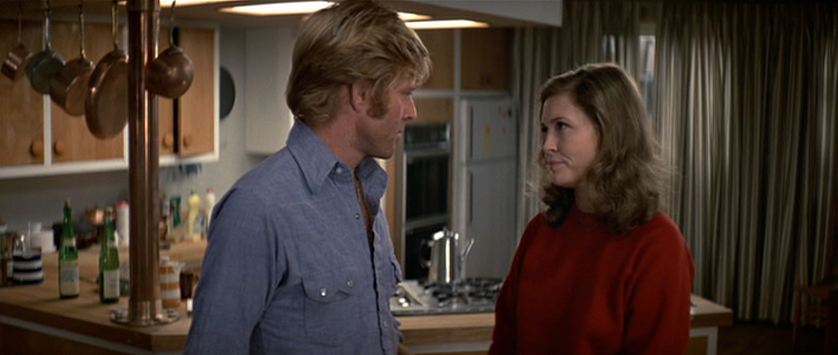
In a moment of desperation, he kidnaps Kathy (Faye Dunaway), forcing her at gunpoint to give him sanctuary in her apartment. For a little while, she is unsure whether to believe his story or not; but eventually she decides that he is not a lunatic and that there are actually people trying to kill him. Of course, this means they must sleep together, even though she is currently living with another man (who conveniently happens to be on vacation in Vermont). She has a case of Stockholm Syndrome, I guess, but there is a lack of chemistry between Dunaway and Redford that prevents their brief romance from coming across as convincing. I think a large part of the issue is that the script is uneven and gives Dunaway some odd lines that shut down entire scenes. In any case, the sexual aspect seems tacked on. She could have added just as much to the story without that (although that would have robbed us of an incredible cornball line from Dunaway).1
After dispatching a hitman disguised as a mailman, Turner uses Kathy to kidnap CIA deputy director Higgins (Cliff Robertson), who fills us in on Joubert (Max von Sydow), a freelance assassin who takes contracts from the CIA. Though he had hoped Higgins was the man pulling the strings, the conspiracy becomes larger and Turner must use his resourcefulness to trace the assassination order to Leonard Atwood (Addison Powell), CIA Deputy Director of Operations in the Middle East. Confronting Atwood, he learns that the whole ordeal is about a CIA plan to seize foreign oil fields in response to the fuel crisis. To the CIA, it was a contingency plan (Higgins refers to it as “a game”), but Atwood wished to go rogue and move forward with the plan. He was the one who hired Joubert to take out Turner and his co-workers.
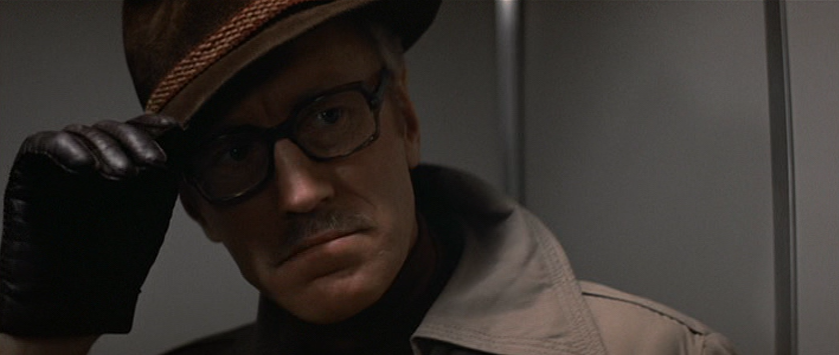
The exposure of Atwood’s plot makes him an embarrassment to the CIA, and they also hire Joubert—this time to take out Atwood and make it look like a suicide. The hit happens when Turner is confronting Atwood, but the Joubert’s contract from the CIA superseded the one from Atwood, and so Joubert allows Turner to live, handing him back his pistol and telling him that the CIA will still be after him.
In a post-Watergate world, just after the “Family Jewels” reports were released, 3 Days of the Condor slots in nicely next to other politically paranoid films of the period like Alan J. Pakula’s Klute (1971), The Parallax View (1974), and All the President’s Men (1976). The film makes the government and its intelligence agencies appear as invisible forces of manipulation, untrustworthy and self-interested. The filmmakers are careful not to give too much information to the viewer, perhaps denying too much, to such a degree that missing any of a number of small details could leave you scratching your head as Turner makes his on-the-fly decisions. A lot of things are implied if you pay careful attention, but there is also a lot that simply isn’t conveyed to the viewer. Some might dislike that the film doesn’t feed you all the answers, but I think that’s just good filmmaking.
At first, Turner seems to be merely a booksmart analyst, but as we watch his actions, learn of his military background, and witness his general resourcefulness, it becomes intriguing to guess what will happen next. He’s unpredictable—scrambling phone traces, using Kathy to infiltrate the World Trade Center, visiting his murdered friend’s wife, and kidnapping a CIA director. It’s similar to a James Bond film, but without the fancy locales and the over-the-top villains; and Turner is only coincidentally our hero. Late in the film, there is an encounter between Joubert and Turner, and an interesting contrast emerges between the workmanlike Joubert and the career man Higgins which colors the freelance hitman as the more sympathetic and honest of the two antagonists.
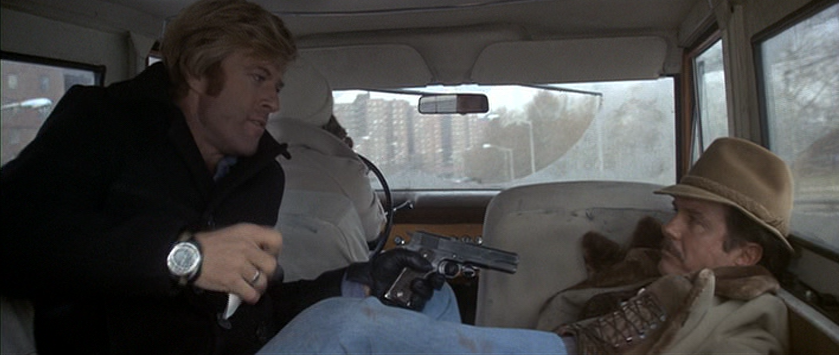
Side note: philosopher Jean Baudrillard included the film in a short list of “retro cinema” films (along with Chinatown, Barry Lyndon, 1900, and All the President’s Men) that encapsulates his idea that cinema, along with photography, have led to a gradual erosion of myth. In his book Simulacra and Simulation—which was a major influence on The Matrix and its sequels—he expounds on the idea that visual imagery “fixes” historical moments into an “objective” form that essentially replaces actual history. But in focusing on rigid historical fidelity, history presented in cinematic form loses much of its mythical quality. “Cinema has become hyper-realist, technically sophisticated, effective. All the films are ‘good’ but they fail to incorporate any element of make-believe; as if the cinema were basically regressing towards infinity, towards a formal, empty perfection.”
3 Days of the Condor is still relevant today not just because of its competent direction and good acting (chemistry issues aside, Redford and Dunaway play their roles well, as does von Sydow and the supporting cast), but because the central themes of political paranoia and government conspiracy are just as concerning today as they were in 1975. The plot that Turner uncovers—to seize oil fields in the Middle East—is debatably one of main rationales behind the American military efforts in Iraq in the 2000s. In any case, well-made films from the 1970s will always have a spot in my collection.
1. Think of the Rolling Stones’ controversial ‘Star Star’ except instead of a star we’re dealing with a spy.
Sources:
Mambrol, Nasrullah. “Jean Baudrillard and Film Theory”. Literariness.org. 2 August 2018.